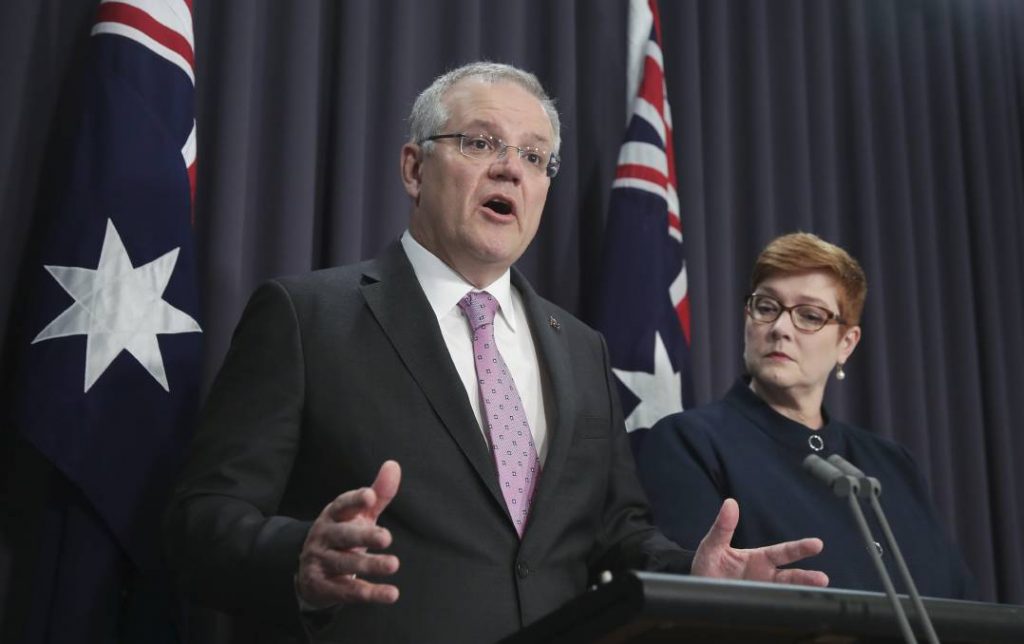Australia/Israel Review
Editorial: Beyond conventional wisdom
Oct 31, 2018 | Colin Rubenstein

Prime Minister Scott Morrison has initiated a process of considering two significant Australian foreign policy adjustments involving Israel and Iran.
The issues themselves are very different, but the arguments for extending official recognition of western Jerusalem as Israel’s capital and moving our embassy there from Tel Aviv, and for withdrawing our country’s support for the 2015 Iranian nuclear deal, are both based upon the need to build Australia’s foreign policy on the firm foundation of contemporary reality.
Many of the arguments against these changes rely on “conventional wisdom” which is increasingly obsolete in the wake of recent international changes.
It makes sense to move the Australian embassy to Jerusalem, first and foremost because it recognises the reality that the western part of the city has served faithfully as Israel’s capital for almost 70 years, home to its parliament, supreme court and government ministries.
Recognising Jerusalem as Israel’s capital wouldn’t harm prospects of the two-state peace paradigm, as some critics have claimed, but safeguard it, by implicitly or explicitly holding the door open for parts of east Jerusalem to serve as the capital of a Palestinian state should negotiations produce such an outcome.
Nor will they risk undermining Israeli-Palestinian negotiations, as conventional wisdom insists, quite simply because there have been no such negotiations for several years, and there is almost no prospect of their resuming anytime soon. The Palestinians are simply unwilling or unable to negotiate seriously at the present time – instead attempting to achieve their state through a unilateralist, international strategy that includes attempts to delegitimise Israel.
In fact, an embassy move may actually help unlock the stalled peace process. With the Palestinian side openly refusing to negotiate in recent years, the US embassy move was part of a strategy by the Trump Administration to break through the impasse by signalling to the Palestinian leadership that such intransigence has a price and time is not on their side. Australia’s bipartisan policy of supporting a negotiated two-state peace would be best served by doing what we can to assist these efforts.
While today moving a country’s Israel embassy to Jerusalem may seem contrary to international norms, history says otherwise. In the early 1970s, over 20 countries kept their embassies in western Jerusalem. The prevailing view at that time quite rightly rejected that such embassies presented any impediment towards the kind of land-for-peace arrangements envisioned in 1967’s UN Security Council Resolution 242. This also remains true today.
The fact that pressure and threats from Arab nations eventually contributed to the migration of embassies out of Jerusalem during the late 1970s and early 1980s has little relevance to the risk analysis facing countries considering moving their embassies four decades later.
Today, in fact, the Sunni Arab states are likely to be more pleased that Australia is reconsidering its support for the nuclear deal with Iran than upset about Jerusalem. They are today far more concerned about the threat posed to the Middle East by Iran – which leads them to see Jerusalem as a potential ally – than Israel’s conflict with the Palestinians.
While to be sure, the Palestinians can still rely upon Arab and Muslim countries to condemn any embassy move, it is simply a fact that there were no significant economic or diplomatic repercussions to the recognition of Jerusalem as Israel’s capital by the US, Russia, the Czech Republic, Vanuatu or Guatemala.
Media reports that Indonesia is considering suspending an imminent free trade agreement in response to Australia’s proposal are grossly exaggerated, focusing on the uncorroborated claims of a single anonymous source while downplaying public declarations by Indonesia’s Trade Minister that the agreement would not be affected.
Also sensible, given recent international developments, is Prime Minister Morrison’s inquiry into whether Australia should support our American ally – which has withdrawn from the Iran nuclear deal known as the Joint Comprehensive Plan of Action (JCPOA) – and signal our willingness to join in with measures to increase the pressure on Teheran for its nuclear and other rogue behaviours.
Three years after it was signed, it is now crystal clear the JCPOA is not working as promised. Arguments that Iran is complying with the deal, and in any case, it is better than nothing in limiting Iran’s nuclear ambition, ignore this recent experience.
Flaws in the deal include the lack of airtight inspections and sunset clauses which mean that, even if Iran was fully complying, the JCPOA could enable Iran to develop nuclear weapons when they expire between 2025 and 2030. It also allows Iran to continue to develop ballistic missiles to carry those weapons and research improvements to its centrifuges to vastly speed up uranium enrichment in the meantime.
Further, the archive of smuggled Iranian intelligence documents revealed by Israel has shown that since the signing of the nuclear deal, Iran has continued to pursue a strategy of non-compliance and incomplete disclosure of its nuclear capabilities and ambitions in violation of the JCPOA’s letter and spirit.
Plus, the JCPOA agreement has effectively empowered Iran to step up its other menacing activities including financial and military support for the brutal Assad regime in Syria, Houthi rebels in Yemen, and terror groups Hamas in Gaza and Hezbollah in Lebanon.
Australia is a country committed to nuclear non-proliferation, and it’s clear that the JCPOA is not serving that objective. Meanwhile, clinging to the flawed JCPOA will alienate and disappoint not only the US, our most important ally, but also almost all the Sunni Arab states.
For these reasons and many more, the Prime Minister’s decision to consider moving the embassy to Jerusalem and review the Iran nuclear deal are appropriate, principled and emphatically in our national interest. To argue otherwise is to cling to outdated positions while remaining blind to the changes which have taken place internationally over the past few years.
Tags: Australia, Iran, Israel, Palestinians






